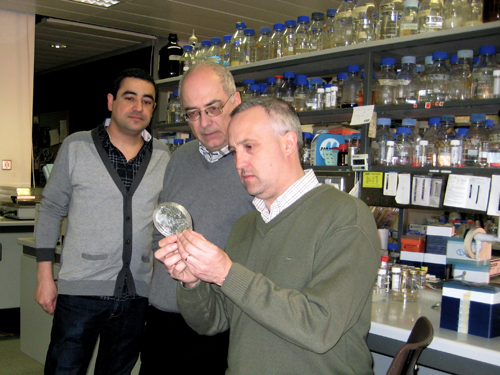Trinity Geneticists Discover Global Strategies used by Bacteria to Adapt to Changing Environmental Conditions
Posted on: 06 March 2012
The research findings, published this week in two papers in the journal Science provide new insights into the behaviour of bacteria
International collaborative research by Trinity College Dublin geneticists has established a blueprint as to how bacteria respond to environmental and nutritional changes at a global and dynamic level that will inform future studies on how bacteria adapt to specific growth conditions including infection. These research findings have just been reported in two papers in the leading international scientific journal Science.
The collaboration between Professor Kevin Devine’s research group at the Smurfit Institute of Genetics in Trinity College Dublin and 14 research groups from eight European countries and Australia, that is part of the EU funded BaSysBio consortium, has identified strategies used by the bacterium Bacillus subtilis to adapt to changes in its environment.
“Bacteria have a profound impact on our lives – in general we either want to use them or kill them: we use them in the food and drink industries and we want to kill those that cause disease, explained Professor Devine. Therefore we need to understand how bacteria sense their surrounding conditions and how they adapt when the conditions change. This study describes in unprecedented detail how bacteria grow and react to changes in their environment. It shows how bacteria are extremely adaptable, but also how they react to a particular condition is not always predictable.”

Kevin Devine, Eric Botella and David Noone examine Bacillus subtilis at Trinity College Dublin.
“Such information can be used to optimise the growth and production of bacteria used industrially – for example to increase product yields while minimising production costs. It also informs us of how bacteria can respond to the antibiotics we use to kill them. Many bacteria adapt to antibiotics and can grow happily in their presence, leading to resistance. The experimental and computational methods developed in this study can be used to establish how such resistance develops in pathogenic bacteria allowing us to develop new strategies and therapeutic agents to kill them.”
Bacteria thrive in even the most inhospitable surroundings and can rapidly adapt to changes in the environmental conditions. These capabilities are the consequence of complex regulatory networks that control gene expression and of dynamic interactions between these networks and cell metabolism. Bacilli are an important model system for the study of bacteria and are closely related to pathogenic bacteria such as Staphyococci, Enterococci and Listeria. Bacilli are also important industrially, producing enzymes and other products for the food and drinks industry.
In this study, the gene expression profile of Bacillus subtilis growing under 104 different environmental and nutritional conditions was established. More than 500 new genes were discovered and the number of promoters identified tripled, showing that the information encoded in the genome is significantly more extensive and complex than previously thought. In addition, the manner by which Bacillus subtilis adapts to the sudden availability of new nutrient sources was established. Surprisingly, one nutrient was rapidly utilised with a relatively small number of adaptive changes whereas a second nutrient was slowly utilised and involved complex changes to almost half the entire gene complement. Thus these two apparently similar adaptation processes are mediated by fundamentally different control mechanisms. Interestingly, in the laboratory it is possible to artificially make the bacterium rapidly utilise the second nutrient by changing expression of only two genes. Thus a very complex process of adaptation to the second nutrient has evolved in preference to a very simple process, presumably conferring an advantage on the bacterium growing in its natural habitat.
Professor Devine’s work on the regulation of bacterial cell wall metabolism during growth and in the presence of the antibiotic vancomycin is funded by Science Foundation Ireland. Drs. Eric Botella and David Noone participated in this study.
